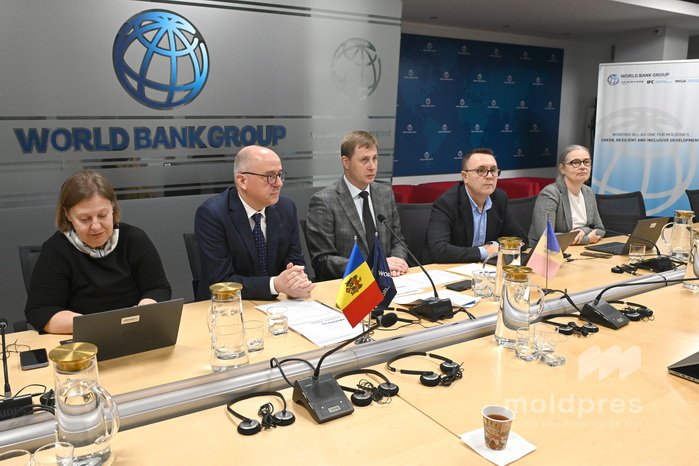
World Bank forecasts acceleration of Moldova's economic growth in medium term
The World Bank forecasts an acceleration of Moldova's economic growth in the medium term, against the backdrop of planned reforms by the authorities, which are expected to become the main factor contributing to increased productivity and investments. The forecasts are contained in the World Bank's report on the economic outlook of our country, presented today in Chisinau.
World Bank Country Manager for Moldova Ulrich Schmitt said that following the parliamentary elections, the country has laid the groundwork for stability and reform continuity, which leads to optimistic economic growth forecasts. The official noted the existence of available resources to drive reforms and Moldova's development in the coming years.
“From the World Bank Group's perspective, we are pleased to have a period of continuity following the elections, and we look forward to working with the new government based on the reform agenda established for the upcoming period. Moldova is in a good situation. There is now a policy alignment offered by the EU accession agenda, collaboration with partners based on this agenda and through the EU's growth mechanism, as well as through multilateral development institutions. There are thus many resources available to propel reforms and Moldova's development in the coming years,” stated Ulrich Schmitt.
World Bank representatives also emphasized that the EU's Reform and Economic Growth Mechanism for Moldova, with a €1.9 billion funding, is a strategic opportunity for the country's development.
Marcel Chistruga, World Bank country economist said that estimates show that by 2025, Moldova is expected to achieve economic growth of 1.5 percent, with an anticipated acceleration of medium-term growth.
“In the medium term, we see an acceleration of economic growth, and we believe that one of the structural factors contributing to this growth will come from productivity. We believe that the planned reforms by the authorities should contribute to an increase in productivity and, consequently, to higher growth rates in the medium term,” said Chistruga.
According to World Bank forecasts, private consumption and investments will remain the main growth drivers. At the same time, the influence of investments on domestic demand will be much greater. “This factor is, of course, conditioned by the absorption of EU funds. On the other hand, another factor is related to net exports. In our view, net exports should have a more positive contribution to growth in the medium term. This will be due to the gradual alignment of Moldova's economy with the European Union. Increased productivity will also positively contribute to export growth,” emphasized Chistruga.
Experts also estimate that inflation will continue its downward trend. “As supply-side pressure eases, we estimate an average annual inflation of 7.8% in 2025. Against the backdrop of moderating prices of imported goods and an economy increasingly aided by net exports, we anticipate that inflation will return to the target range of the NBM, at the beginning of 2026, and fluctuate within the lower limit of this range in the medium term,” said Chistruga.
In addition, specialists note that inflationary pressures persist, mainly driven by prices of energy resources and food products. “The restrictive monetary policy from the first half of the year has been relaxed. This signals a transition to a more favorable monetary policy, but for the moment it remains quite cautious. Besides aiming to maintain economic growth amid lower inflation, there are also inflationary pressures that the National Bank keeps in sight,” added the expert.
Moldova has been a member of the World Bank since 1992. According to World Bank data, since 1992, the financial institution has allocated over $2.1 billion for more than 70 operations in Moldova, covering areas such as regulatory reform and business development, government service modernization, tax administration, land registry, education, roads, health, agriculture, water, sanitation and energy.
Moldova's state budget revenues increase by 15 per cent in first nine months of 2025
Energy minister says Moldova expresses intention to participate in construction of new unit at Cernavoda nuclear power plant of Romania
European Commissioner says current determination to shape Moldova's place in Europe for next generations
High-level dialog on finance and economic growth held in Chisinau
Sanctions on LUKOIL do not affect aircrafts' refueling in Chisinau at present
National Energy Regulatory Agency's leadership, U.S. Embassy's representatives analyze identifying alternative sources, routes for supplying Moldova with oil products
Weekly payments collected via Single Euro Payments Area in Moldova increase by 186 per cent
Moldovan electricity market operator starts registration of participants in organized electricity markets
European Commissioner for Financial Services and Savings and Investments Union to come to Chisinau
Energocom company of Moldova procures electricity at average price of 132 Euros/MWh in last October
Moldova's Munteanu government holds first meeting on November 5
Moldova denounces Cultural Agreement with Russian Federation
VIDEO // Moldovan President begins working visit to Brussels with meeting with António Costa
Moldova to celebrate World Wine Tourism Day 2025 with professional event at local winery
Moldovan authorities inspect hundreds of documents, vehicles, biometric profiles during I-FORCE operation
World Bank forecasts acceleration of Moldova's economic growth in medium term
VIDEO // Health Minister announces mandate priorities: modern medical services and system digitalization
VIDEO // Chisinau International Airport enhances safety level with acquisition of unique intervention vehicle
Moldova's Foreign Minister: Truth and education most powerful tools for defending democracy
DOC // Decisions on election of Parliament Vice Presidents and establishment of standing committees published in Official Journal
Attention carriers: Bulgaria temporarily suspends traffic on Giurgiu–Ruse Friendship Bridge
CEC: Deadline for observer accreditation for new local elections expires on 9 November
Over 95,000 applications for energy compensation submitted on first day of registration launch
Delegation of Chamber of Commerce and Industry on economic mission in Brussels
DOC // Presidential decree on appointment of new Cabinet of Ministers published in Official Journal

